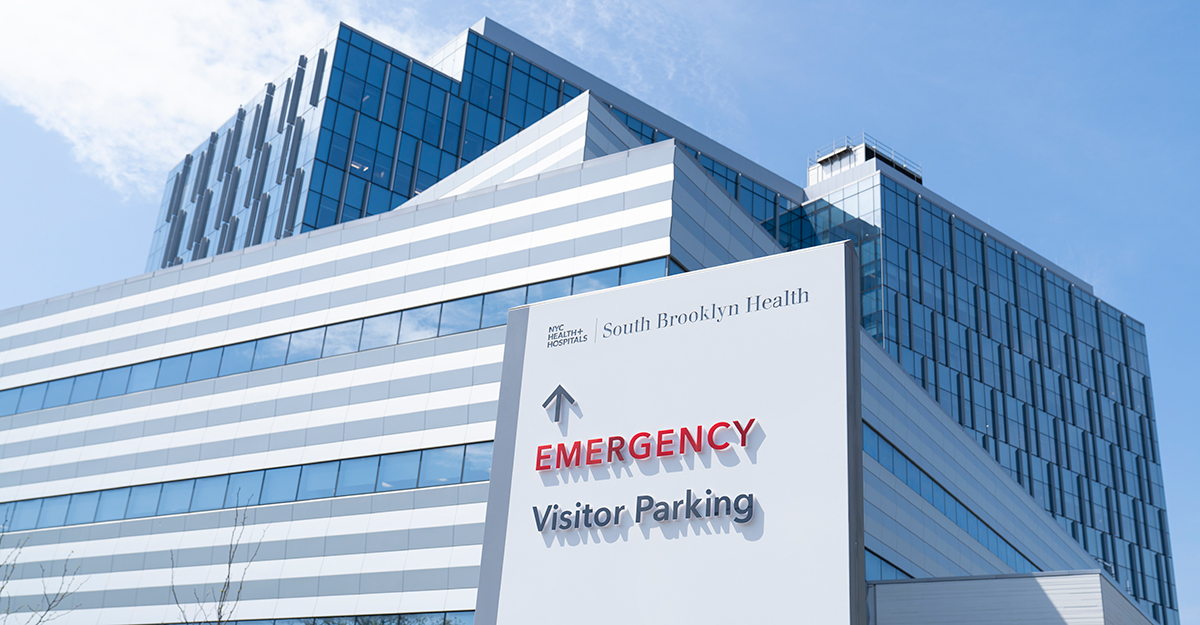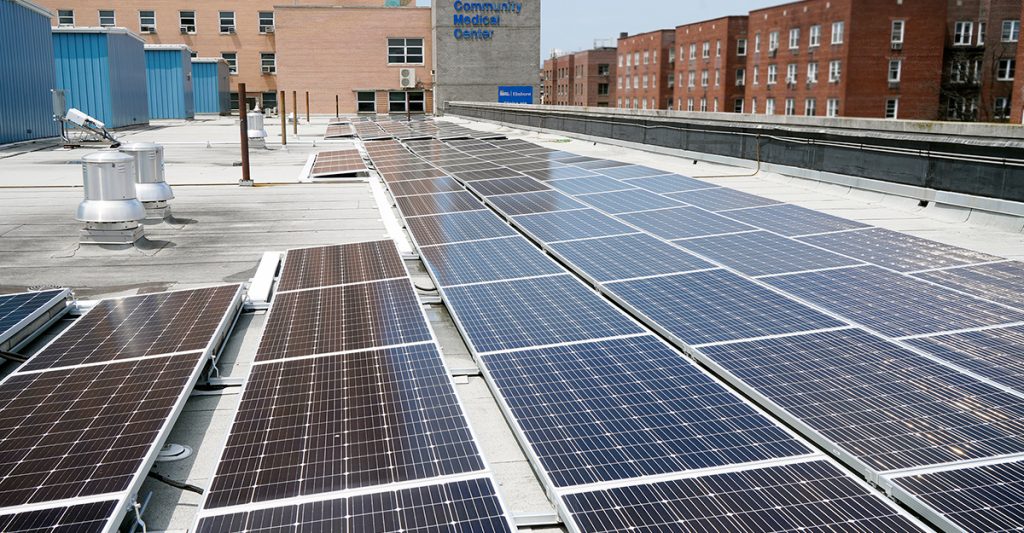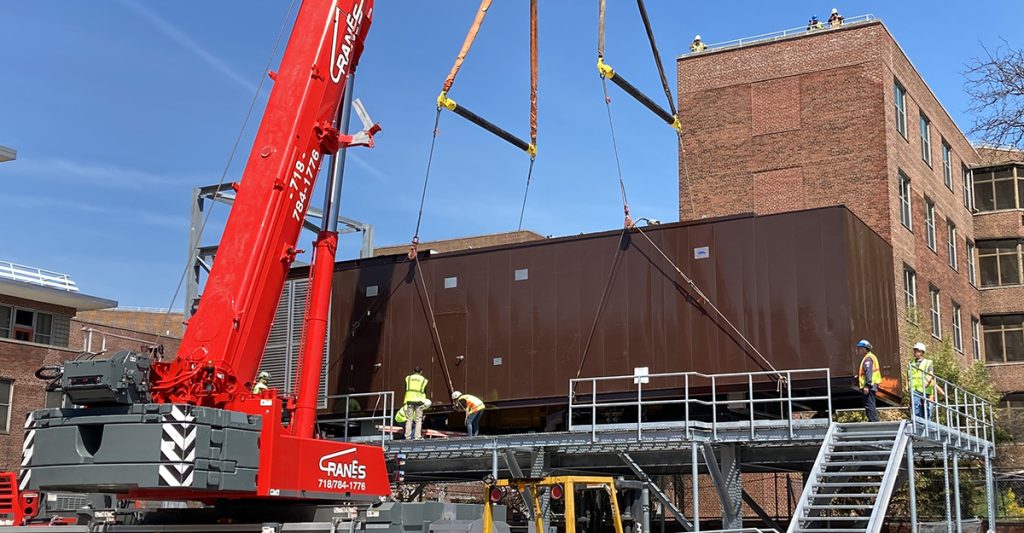NYC Health + Hospitals Details Climate Resilience Plan, Building on Existing Efforts and Commitment
The plan fulfills a key commitment under the U.S. Department of Health and Human Services Health Sector Climate Pledge, which NYC Health + Hospitals signed in May 2022 The Climate Resilience Plan aligns with the Mayor's PlaNYC: Getting Sustainability Done long-term strategic climate plan The health system has already achieved a 30% reduction in carbon dioxide emissions since 2006 and is continuing its efforts to hit a 50% reduction target by 2030
May 22, 2024

NYC Health + Hospitals today announced completion of its Climate Resilience Plan, a significant milestone in its commitment to ensuring the resilience of the health system’s infrastructure in the face of climate change. The plan fulfills a key commitment under the U.S. Department of Health and Human Services Health Sector Climate Pledge, which NYC Health + Hospitals signed in May 2022. It is the result of a thorough survey of the health system’s hospitals and post-acute care facilities. A team studied the impact of climate hazards, such as stormwater flooding, coastal flooding, extreme heat, and wind, on each facility under different levels of projected greenhouse gas emissions and the resulting extreme weather due to climate change. It considered the impacts on key facility operations, including electrical power, natural gas, steam, telecommunication, potable water, wastewater, transportation, and logistics. The Plan recommends a series of infrastructure projects, such as installation of additional emergency generators linked to critical HVAC equipment, improving the drainage capacity of roofs and windows, building additional flood barriers, and installing green infrastructure to reduce ponding and heat island effect. This effort builds on the health system’s commitment to addressing climate change while reducing its carbon footprint. NYC Health + Hospitals has already achieved a 30% reduction in carbon dioxide emissions since 2006 and is continuing its efforts to achieve a 50% reduction by 2030. The Climate Resilience Plan aligns with the Mayor’s PlaNYC: Getting Sustainability Done long-term strategic climate plan.
“NYC Health + Hospitals has been committed to reducing its carbon footprint and protecting its infrastructure against climate hazards, and the Climate Resilience Plan is another step forward in addressing climate change at our facilities,” said Anna Speed, Director of Sustainable Design and Resiliency at NYC Health + Hospitals. “The Plan brings to light vulnerabilities within our infrastructure in connection with climate change. Using this valuable insight, we aim to integrate and embed resilience projects into our 10-year capital plan. This strategic approach ensures that we fortify our system’s capability to deliver exceptional care, especially amidst adverse weather conditions and other climate-related emergencies, while lowering our carbon emissions overall.”
“The development of the Climate Resilience Plan, a significant milestone for our organization, signifies our commitment toward meeting the complicated challenges of climate change, thanks to our creative, diligent, and passionate teams,” said NYC Health + Hospitals Vice President of Facilities Manny Saez, PhD.
“As we’ve seen with PlaNYC, when you set climate goals, you’re able to make real, demonstrative progress when it comes to climate action,” said Mayor’s Office of Climate & Environmental Justice Executive Director Elijah Hutchinson. “Protecting our residents from the impacts of climate change requires a whole-of-government approach and we applaud NYC Health + Hospitals with coming up with a plan that complements the work we’re doing to cut our carbon emissions.”
NYC Health + Hospitals has an overall footprint of 20 million square feet in over 75 buildings and over 1,000 pieces of mechanical equipment such as boilers, generators, air handling units, and elevators, all of which directly contribute to the health system’s carbon emissions.

The Climate Resilience Plan, developed over the past two years with architecture and design firm Gensler and Arup Engineering, includes the following recommendations:
- Utility Recommendations
- Assess generator capacity and increase capacity where needed; consider emergency generator quick connections.
- Ensure critical HVAC equipment is connected to back-up generators and ensure adequate redundancy.
- Elevate and/or floodproof critical equipment located below ground and on ground level, if located in a flood zone.
- Building Enclosure Recommendations
- Improve drainage capacity of roof membranes and windows.
- Replace roof membranes, windows, and building facades at end of useful life to mitigate against wind-driven rain, improve energy efficiency, and enhance patient and staff comfort.
- Site Recommendations
- Construct flood barriers and/or stormwater detention systems to prevent flooding during extreme weather events.
- Install porous pavement and/or green infrastructure to mitigate ponding, such as bioswales and rain gardens.

The Climate Resilience Plan builds on several recent infrastructure investments at NYC Health + Hospitals:
- The $923 million Ruth Bader Ginsburg Hospital opened last year on the campus of NYC Health + Hospitals/South Brooklyn Health. Funded by the Federal Emergency Management Agency (FEMA) after Superstorm Sandy, the hospital is designed to withstand the next 500-year storm, including a flood-proof Emergency Department on the 2nd floor, a four-foot flood wall, and flood-resilient power, heating, cooling, and water systems on the 5th floor of the building.
- With the support of a Hazard Mitigation Grant from FEMA, NYC Health + Hospitals has several ongoing projects at NYC Health + Hospitals/Bellevue, South Brooklyn Health, Metropolitan and Coler to protect them from a 1 in a 500-year storm event, including:
- Floodwalls and gates to protect from storm surges.
- Installation of backflow preventers to prevent overflows from the sanitary system from entering facilities.
- Elevating and protecting key infrastructure such as electrical equipment and alarm systems.
- Installing new generators and quick connect systems to allow facilities to operate in a power outage for at least 72 hours.
- Upgrading boiler plants and burners at several sites across the system. By shifting from consuming five million gallons of fuel oil annually to primarily utilizing natural gas for its thermal energy needs, the health system has significantly reduced emissions and minimized its environmental impact.
- LED lighting upgrades at several sites across the system.
- Installing solar panels at NYC Health + Hospitals/Elmhurst, the first of its kind in the health system. This 55-kilowatt system will generate enough power to light up 14 New York City homes.
- Developing a Combined Heat and Power Plant at NYC Health + Hospitals/Bellevue to reduce emissions and contribute towards resiliency.
The US Department of Health and Human Services Health Sector Climate Pledge is a voluntary commitment to:
- Develop and release a climate resilience plan.
- Designate an executive-level lead for work on reducing emissions and conduct an inventory of Scope 3 (supply chain) emissions.
- Reduce organizational emissions by 50% by 2030 and achieve net-zero by 2050.
The health system has already achieved a 30% reduction in carbon dioxide emissions since 2006. Decarbonization often involves upgrading building infrastructure with more efficient, modern systems, such as better insulation, high-efficiency HVAC systems, and advanced building materials. Such improvements can make buildings more resilient to external climate conditions and disasters, maintaining internal conditions more effectively and ensuring patient comfort and safety. In addition, these improvements also reduce building energy needs and extend the operational time of emergency backup systems, which contribute toward its resiliency.
In addition to infrastructure upgrades, NYC Health + Hospitals has reduced climate emissions through its commitment to serving plant-based meals to its patients. The health system has served over 1.2 million plant-based meals since the program launched in March 2022. In addition to the considerable health benefits for patients, the plant-based meals served in 2023 led to a reduction in carbon emissions of 36% and a cost savings of 59 cents per meal.
###
MEDIA CONTACT: Press Office
#082-24
About NYC Health + Hospitals
NYC Health + Hospitals is the largest public health care system in the nation serving more than a million New Yorkers annually in more than 70 patient care locations across the city’s five boroughs. A robust network of outpatient, neighborhood-based primary and specialty care centers anchors care coordination with the system’s trauma centers, nursing homes, post-acute care centers, home care agency, and MetroPlus health plan—all supported by 11 essential hospitals. Its diverse workforce of more than 43,000 employees is uniquely focused on empowering New Yorkers, without exception, to live the healthiest life possible. For more information, visit www.nychealthandhospitals.org and stay connected on Facebook, Twitter, Instagram and LinkedIn.